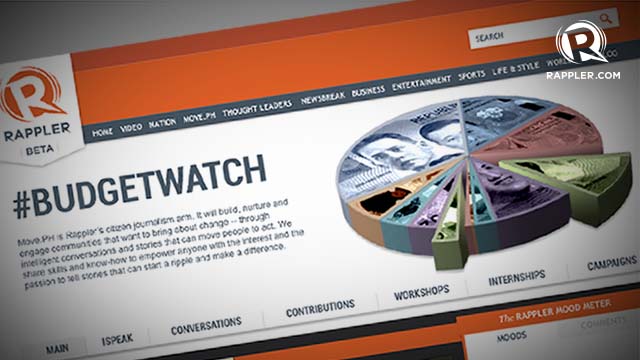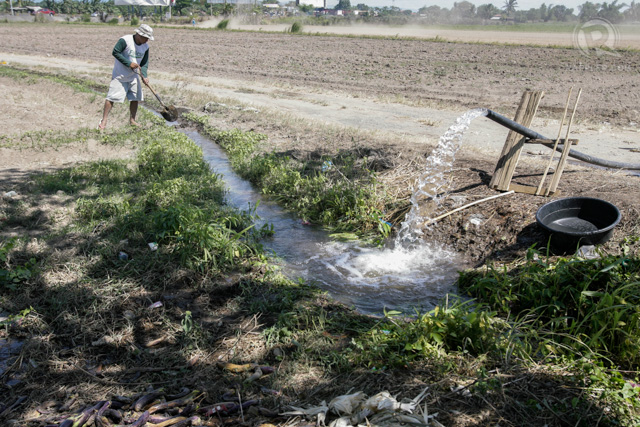SUMMARY
This is AI generated summarization, which may have errors. For context, always refer to the full article.

MANILA, Philippines – Campaigning for citizen awareness and participation in the budget process, Rappler’s MovePH is launching the #BudgetWatch microsite which will feature information on the budget process, reports related to the budget, and budget-related opinions from experts and advocates.
While there is general agreement that the national budget is a strong element in the country’s development, there is also a general sense that, apart from some non-government and civil society organizations, very few ordinary citizens display concern for, and involvement in, the budget process.
There is perhaps no other public decision that has a more powerful impact on the lives of people than decisions about budget allocation and spending. It is through this that government makes decisions on critical issues such as health care made available to pregnant mothers, the quality of education that students from poor families will receive, and the availability of infrastructure that will support farmers and allow them to supply and deliver food.
Ultimately, many of the problems that persist in our country, poverty included, stem from the choices that government makes about the budget. Thus, it becomes imperative for citizens to engage in these decision-making processes.
Information on the budget process
For citizens to equally engage, however, they need tools that will allow them to navigate through the intricacies of the budget process. Key to this is the accessibility of information. #BudgetWatch offers information that will allow ordinary citizens to understand how decisions on the budget are made, and what their implications on ordinary life are.
#BudgetWatch comes at a time when the present administration is trying to increase public engagement in the budget process.
In a previously published story on the launch of Budget ng Bayan, the website of the Department of Budget and Management (DBM), Chief Information Officer Richard Moya said, “The government can only hire so much auditors, but if everyone is an auditor then it would substantially help us in the government make financial transactions more transparent.”
One of the recent features that DBM introduced in drafting the 2013 national budget was the involvement of civil society organizations in the drafting of the budget proposal at the agency/department levels. Nine departments participated in the pilot testing which included the departments of health, education, social welfare and development, and agriculture.
One of the civil society organizations that partnered with the education department is the Philippine Business for Education (PBEd). Their case study on monitoring the school budget will be among the research studies that will be published in #BudgetWatch.
Space to engage
Bottom-up-budgeting, otherwise known as “BUB” is one of the initiatives under the Open Government Partnership (OGP), a global multilateral initiative geared toward promoting transparency.
One of the areas where BUB is strategically implemented is poverty reduction and alleviation. It provides a mechanism for local government units and civil society organizations (CSOs) operating in identified “poor communities” to work together in identifying programs to address poverty.
Caucus of Development NGO Networks (CODE-NGO) works with organizations for the implementation of the bottom-up budget initiative. According to Paul RA Paraguya, CODE-NGO program manager, a major challenge is equipping local CSOs with skills that will allow them to come up with a more systematic way of drawing up poverty reduction proposals and then implementing them. Ideally, it is a process that is “backed up with more local research and analysis with improved negotiation and lobbying with LGUs,” Paraguya explained.
Stories and reports from non-government and civil society organizations will be part of #BudgetWatch’s site content. Thus, it will provide readers with different lenses to analyze various budget-related reforms and initiatives.
Discussion and participation
An issue as relevant and important as the budget attracts a number of experts, advocates and leaders. And we invite them to share their opinions and insights on the #BudgetWatch site. In the line-up are opinion pieces from Sen Teofisto “TG” Guingona III and Social Watch’s Prof Leonor Magtolis Briones.
#BudgetWatch offers a platform to the general public to discuss their own personal thoughts and ideas on issues that have tremendous impact on the quality of lives. Some of these include the following:
1. Agriculture
As El Niño is predicted to threaten rice production this year, will the Department of Agriculture effectively use its 2013 budget increase to address the forecast effectively?

2. Flooding
With the recent release of the P1.6-B Metro Manila Development Authority (MMDA) budget for flood control, are we assured of an enhanced flood control system ahead of the projected rainy season?

3. Education
The proposed 2013 budget for state colleges and universities (SUC) was approved, increasing the SUC budget by close to 50% from the 2012 budget. How does this translate to equal access to quality higher education especially for poor students?
The budget matters to every citizen who should see to it that it is allocated and used efficiently and effectively. So take heed, be informed and mind our budget.
#BudgetWatch works in partnership with government units such as the DBM and the Department of Finance (DOF), as well as with organizations and institutions which include, among others, the Makati Business Club (MBC), the Ateneo School of Government (ASOG), INCITEGov, Research Education and Institutional Development Foundation Inc. (REID) and Action for Economic Reforms (AER). – with reports from Bon S. Cabiles/Rappler.com
Add a comment
How does this make you feel?
There are no comments yet. Add your comment to start the conversation.